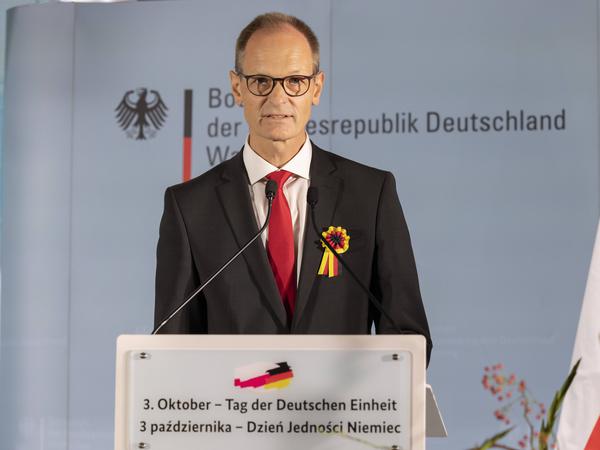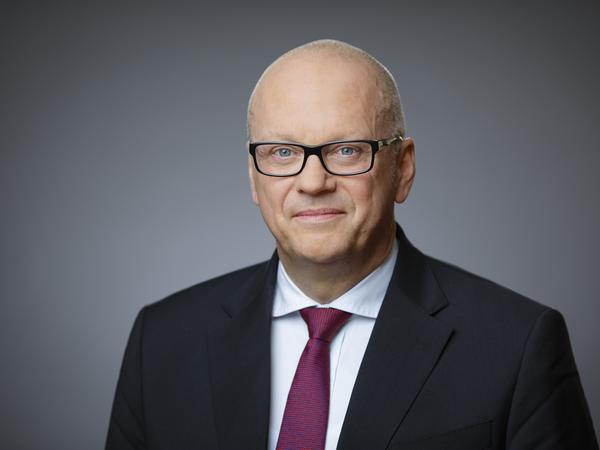Is there a strange beast up to mischief in the Foreign Office (AA)? That’s the thought one might get from listening to Christian Wagner, one of the Foreign Ministry spokesmen, earlier this year. “There is a beautiful monster in the Foreign Office that calls itself a ‘uniform transfer date’,” he said before the federal press conference. It was meant ironically.
The fact is: In other federal ministries, civil servants are transferred throughout the year. Only those who work at the AA headquarters on Werderscher Markt or in one of the German representations around the world have to deal with the fact that they have to move from one post to another throughout their professional life, usually after three to four years .
This year, in just a few months, so many highly qualified and experienced managers are changing in the Foreign Ministry that even Wolfgang Ischinger, who has already experienced a lot in and with his former ministry, is impressed. It is a special time, more than a year after the start of Russia’s aggressive war against Ukraine.
“In the summer of 2023, a particularly extensive reversal is imminent in the AA at the level of state secretaries and B9 ambassadors,” praises the doyen of German diplomacy, former AA state secretary, ambassador in Washington and long-time head of the Munich Security Conference. “B9” stands for the highest salary group, only ambassadors in very important missions reach it.
The AA’s HR department “very cleverly put together a rather complicated puzzle in such a way that Minister Annalena Baerbock could only really say: That’s fine, that’s right!” Ischinger says.
The workforce can also be happy, because the newcomers to the important posts are “all AA homegrown with a stable smell, no political lateral entrants,” says Ischinger. Fortunately, technical competence and professional experience count for more than party membership.
At the beginning of her term of office, the foreign minister alienated some in her house when she replaced the highly esteemed State Secretary Miguel Berger, possibly because he was considered a social democrat and had once worked for the SPD parliamentary group. Ischinger does not see such motives when it comes to a new state secretary and more than a handful of ambassadors at important locations.
Baerbock probably caused the biggest surprise when Thomas Bagger was appointed State Secretary. Because the current ambassador in Warsaw had previously worked for the current Federal President and former Foreign Minister Frank-Walter Steinmeier and thus also helped to prepare a Russia policy that is now considered to have failed and which the current Foreign Minister viewed critically.

But the 58-year-old son of the former Bundeswehr Inspector General Hartmut Bagger had also worked for Foreign Ministers Klaus Kinkel, Joschka Fischer (as speechwriter) and Guido Westerwelle (as office manager and head of planning staff). And he always had a reputation for making his own judgements.
The Bulgarian political scientist Ivan Krastev, who is a friend of Bagger’s, quotes an important essay by the diplomat in his book “The Light That Got Out”. In the 2019 text entitled “The World According to Germany”, Bagger explained why Germany, after two dictatorships and reunification, committed itself more than other nations to the illusion that the liberal world order could now prevail without challengers. As you know, things turned out differently.
In the new job, the diplomat not only has to excel intellectually, but also handle organizational tasks, such as persuading the German embassies to take care of a stronger image in their host countries, which is one of his minister’s concerns.
Bagger will “definitely make bella figura in the office of State Secretary,” Ischinger judged: “Intellect, experience and political sure-footedness come together here.” According to colleagues, Bagger also benefited from these qualities in the difficult job in Warsaw.
Lambsdorff was annoying with the urge to go to Washington
The man Bagger is to replace, Andreas Michaelis (63), is going to Washington as ambassador. The trained diplomat and FDP parliamentary group deputy Alexander Graf Lambsdorff would have liked to go there, but the minister got on his nerves at his constant urging and she judged him to be too loyal a transatlanticist, according to Green foreign politicians. That’s why Baerbock didn’t credit him with enough commitment to European and German interests, especially in the event that another Republican wins the US presidential election in 2024.

Michaelis, whom Joschka Fischer met when he visited Ramallah and later made him his spokesman, was considered the dominant figure in the ministry during his first term as State Secretary (2018 to 2020).
However, his then Minister Heiko Maas (SPD) was far less ambitious and passionate about foreign policy than his successor Baerbock, for whom Michaelis worked in the same capacity from January 2022. At the time, the returnee had plans for foreign policy reform in mind, but then overcoming the war was more important.
A team of real professionals for the further foreign policy implementation of the turning point.
Wolfgang Ischingerformer State Secretary in the Foreign Office and former head of the Munich Security Conference
In his new job, Michaelis is believed to be able to mediate between the different approaches of the Chancellery and the Federal Foreign Office and to bundle them into a unified line in Washington. Personal quarrels between him and Jens Plötner, foreign policy advisor to Chancellor Olaf Scholz (SPD), are not known, although both work for very different people and the ideas of the two houses, for example on the national security strategy and the China strategy, differed widely.
Geza von Geyr, the diplomat whom Lambsdorff is now succeeding in Moscow, becomes a representative at NATO. Moscow was one of the largest German embassies, but waves of diplomatic expulsions have decimated the workforce, and contact with civil society is considered extremely difficult under the conditions of the dictatorship.
Last GDR ambassador goes back to Paris
Von Geyr, who also worked in the office of the then deputy head of the Union faction, Wolfgang Schäuble (CDU), and was vice president of the Federal Intelligence Service (BND), is well qualified for the post at NATO: he was head of the politics department from 2024 to 2019 Department of Defense.
Among the new ambassadors is another close confidante of today’s Federal President Steinmeier: Stephan Steinlein has been with him since 1999, when Steinmeier was Head of the Federal Chancellery, and later became State Secretary in the Federal Foreign Office under him. Steinlein will soon be in charge of the embassy in Paris, for the second time in his life.

Because as the last ambassador of the GDR, sent there by Foreign Minister Markus Meckel, it was his job to close the representation of the dying state. Irrespective of the rank he had achieved, the theologian from the GDR then applied for attaché training in reunified Germany – and made a career for himself. Now he has come full circle.
Unlike his longtime boss Steinmeier, Steinlein defended Germany’s Russia policy as correct at the time. During the break between leaving as State Secretary in the Office of the Federal President in March 2022 and moving to Paris, he gave an interview to Swiss newspapers in which he said, among other things: “You are always smarter in hindsight.”
The still acting head of the Palais Beauharnais in Paris, Hans-Dieter Lucas, moves on to Rome, his predecessor there, Viktor Elbing, in turn succeeds Thomas Bagger in Warsaw. But not only men are changing in the house of the avowed feminist Baerbock: Bettina Cadenbach, still Deputy Secretary General of NATO, will try as ambassador in Brasilia to strengthen Germany’s connection with the progressive Brazilian government of Luiz Inacio Lula da Silva, who is involved in the course of the West quarrels when it comes to supporting Ukraine.
The members of the AA staff tableau are taking on their duties at a time that is extremely challenging for German foreign policy. Because it has had to reinvent itself to some extent since Russia’s war of aggression. Ischinger’s conclusion: “One can congratulate the house and the minister: a team of real professionals for the further foreign policy implementation of the turning point!”
